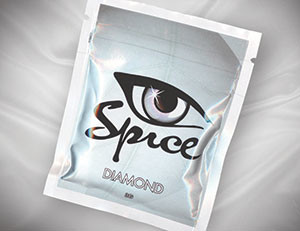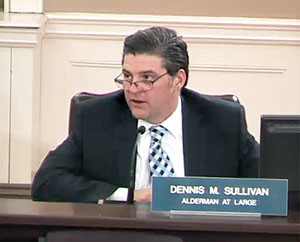
Synthetic cannabinoids and other chemical-based stimulants are being targeted for possible banning in the City of Somerville by the Board of Aldermen.
By Josie Grove
“As a new father, I want to make sure Somerville is as safe as it can be for young people,” says Alderman Dennis Sullivan. That’s why, at last week’s meeting of Somerville’s Board of Aldermen, Sullivan brought proposed an ordinance to ban synthetic cannabinoids in the city of Somerville. “I cannot see a reason to have this on the shelves in Somerville,” he says.
Synthetic cannabinoids are chemicals that imitate the effects of those chemicals to produce a high allegedly similar to smoking cannabis. The chemicals are not regulated and not standard, so potency varies widely. Manufacturers spray the chemical onto dried leaves, and package the product as potpourri or incense. This intentional mislabeling, and the package specification that the product are not for human consumption, helps manufacturers skirt FDA regulations.
A federal ban on synthetic drugs has been in effect since 2012, but it has proved difficult to enforce. As soon as one chemical compound is banned, manufacturers switch to a different one. Since the chemistry often changes, the drug’s potency and effects are difficult to predict. “I know it keeps changing, but we’ve got to tighten it up,” said Sullivan. “I think the main thing is to not have it sold in the city.”
The Centers for Disease Control and Prevention has been collecting data about the drugs from calls to poison control centers across the country, and released a report in June. Nationwide, there were 3,572 calls about synthetic cannabinoids between January and May 2015, a 229% increase over the same period in 2014. Since not all users call poison control centers, the number of calls are not necessarily good indicators of how many people are actually using the drugs.

Alderman at Large Dennis Sullivan is leading the effort to have synthetic cannabinoids banned in the city.
Sullivan says he has seen synthetic cannabinoids in his work as a corrections officer in Boston. “I’ve seen the effects of it on people. Seizures, paranoia, all types of issues,” he says. “People with clean medical records have had seizures. I think it’s more harmful than marijuana.” 335 of those 3,572 calls, or just under ten percent, involved life-threatening effects, and 15 of those died. The CDC qualifies this number, saying it is not possible to tell whether those severe effects resulted from synthetic cannabinoids alone, or if he drug was used in conjunction with alcohol or other drugs. Most of the 3,572 callers reported minor effects including agitation, rapid pulse, drowsiness, confusion, and vomiting.
Alderman Sullivan is concerned about the drug’s potential appeal to young people. “It has cartoons on it, such as Scooby Doo and the Iron Hulk [sic], it’s geared toward a younger population,” he says. According to the CDC, the median age of users in the calls is 26.
Last month, the City of Boston banned the possession, sale, manufacture or distribution of synthetic cannabinoids last month. Violators face $300 fine per incident, but no jail time. Alderman Sullivan thinks this is an adequate deterrent. “I think a $300 fine is a huge deal for people in this economy,” he says. “I think that makes sense, and we have to mirror what happens in Boston.”
The alderman is optimistic about the ban, even though the federal ban has proven difficult to enforce. “I think banning it is going to be effective. I don’t think it’s going to be the cure-all, but you’ll have to go to another city, not Somerville and not Boston, somewhere else to get it,” said Sullivan. “If we ban it, it could cause other people to ban it too. I think it could only help. I don’t think it’s going to be the cure-all, I’m not that naive to think that that’s going to fix the problem, but I think it’s another hurdle to make it more difficult for someone to obtain.” Sullivan also mentioned working with community anti-drug groups to bring information about the dangers of synthetic cannabinoids to parents and schools.
The Board of Aldermen approved of the measure proposed last Thursday, not to ban synthetic cannabinoids right away, but to begin the process to pass the ordinance. “The order called for the city solicitor to draw up language, banning it in Somerville,” said Alderman Sullivan. “It would go before the Board of Aldermen and the committee, probably Public Health and Public Safety, and they would review it, tweak it, change it, and we’d vote on it, and the mayor has to sign it.”












Reader Comments